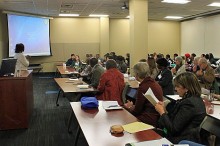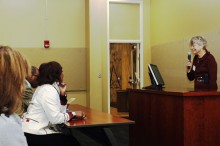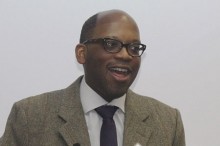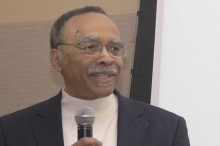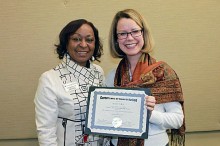2013 Atlanta
SIXTH ANNUAL CTAUN CONFERENCE IN ATLANTA
TAKING ACTION TOWARD ERADICATING POVERTY
Saturday, 2 March 2013
College of Education, GA State University (GSU), Atlanta, GA
CONFERENCE REPORT
Conference Welcomes were extended by:
Anne-Marie Carlson also introduced the opening keynote speaker.
Opening Keynote Address
David Anthony, Chief of Policy Advisory and Advocacy at UNICEF who also had served as editor of the organization’s flagship publication, “The State of the World’s Children” gave the opening address. Mr. Anthony also served as director of country risk at The Economist Group and worked for the European Commission. His presentation included specific data on children and their families living in poverty around the world. Participants learned about the work done by UNICEF on the part of our children and youth. Participants left with a sense of commitment to championing causes that will make a difference in the lives of families across the globe who are living in poverty.
Concurrent Sessions – Block 1
Informational Technologies and Poverty Eradication
Doug Edwards, Center for Education Integrating Science, Georgia Institute of Technology
This session examined projects focusing on using digital and other forms of technology to promote education and eradicate poverty. Key types of information technologies such as computers, the Internet, and mobile phones, and their incorporation into broader practices such as micro-business were explored.
The Impact of Homelessness on Georgia Students: Building Supportive Partnerships
Joanna Johnson, Georgia Department of Education
This session set out to foster sensitivity and awareness of the impact of homelessness on children and youth in the State of Georgia. Data from Georgia’s homeless liaisons provided an overview of the situation. Discussions centered on interventions, strategies and collaborations to address the problems and to ensure academic support for children and youth experiencing homelessness.
Poverty and Students with Disabilities
Patty McHatton and Jill Williams, Kennesaw State University
This interactive session gave participants strategies and resources for addressing the needs of all students in their classrooms. The concepts of developing warm, caring relationships, providing academic content in meaningful ways, allowing for student choice, and home-school collaboration, were explored and discussed. Participants were provided with resources they could use immediately in their own classrooms.
Urban Gardening
Judy Orton, PHD Candidate, Georgia State University
The session provided an overview of the benefits of community gardens to those living in poverty. First, community gardens can provide people from impoverished backgrounds valuable access to fresh fruits and vegetables (Stein, 2008), which is especially important in areas where people may not have access to fresh produce (i.e., “food deserts”). Second, community gardens can provide opportunities for economic development, such as “entrepreneurial gardens” (Draper & Freedman, 2010), which allow garden members to sell their produce to local restaurants or farmer’s markets. Finally, community gardens allow children to participate in educational, science-based activities while making valuable contributions to their community (Fusco, 2001). Community gardens in the metro-Atlanta area were discussed.
Choice Making: A Strategy to Decrease Problem Behaviors
Maria Shockley, Habitat for Humanity, Tony Johns, City of Refuge
Often times, we find that students in poverty stricken schools have many behavior problems. Choice making occurs when a child selects a preference from among two or more options. Choice making can be used as an intervention strategy to increase participation while decreasing the likelihood of challenging behavior. This session provided information on how to incorporate choice making in to the daily schedule of a classroom, the benefits of choice making, and findings from research on the subject.
Concurrent Sessions – Block II
Community Collaboration as a Support for Academic Success
Brittany Brewer and Mina Veazie, Network for Enhancing Teacher Quality
This presentation was about choice making as a proactive intervention to decrease problem behavior. Often times, we find that students in poverty stricken schools have many behavior problems. Choice making occurs when a child selects a preference from among two or more options. Choice making can be used as an intervention strategy to increase participation while decreasing the likelihood of challenging behavior. Steps to intervention for classroom teachers were presented. Monitoring strategies, special considerations, and future directions were also included.
Unleashing the Genius: Strategies to Empower Urban Youth
Blake Williams, Vance Smith Helena Smith and Catherine Gibson
Systemic social structures, which maintain a generational cycle of poverty in urban areas, directly impact urban youth. This session provided insight into the strategies and school projects being implemented by young educators in the T.E.A.M. AmeriCorps Program, and how the use of service learning and innovative school projects seek to energize and empower students while building community relationships.
Informational Technologies and Poverty Eradication
Doug Edwards, Center for Education Integrating Science, Georgia Institute of Technology
This session examined projects focusing on using digital and other forms of technology to promote education and eradicate poverty. Key types of information technologies such as computers, the Internet, and mobile phones, and their incorporation into broader practices such as micro-business were explored.
Influence of Poverty on Health Disparities
Na’Take Osborn Jelks, MPH, Ph.D. Student – Georgia State University Institute of Public Health
This session explored the important links between poverty and health status. Using international, national and Atlanta-based data and examples, presenters examined how large a role poverty and socio-economic status (SES) plays in influencing the health of populations and health disparities. Examples were shared through the lens of environmental health challenges among others.
Reducing Disparity: A Community Development Approach
Melissa Clayton, Atlanta Missions, and Tony Johns, City of Refuge
Across the nation, pockets of extreme poverty and homelessness exist adjacent to concentrations of great resource. The presenters focused on a multi-tiered community development approach to address the complex challenges that are central to this extreme disparity. This approach has led to transformational effects across neighborhoods and individuals. Essential elements of this approach were discussed.
Lunch Keynote Address
Dr. Luther E. Smith’s presentation “Keeping it Real: Inviting Poverty into the Classroom” focused on poverty as a pervasive reality in societies. While the discussion of poverty is often absent from political discourse, religious discussions of mission, and classroom lessons should include the topic. He indicated it is critical that students be prepared to understand their world, including the reality of poverty. Ignoring poverty forsakes the commitment to truth telling that is fundamental to a world in which we want to live. Dr. Smith’s address focused on how teachers can be a force for making the realities of poverty known in ways that contribute to a truth-telling classroom and a more compassionate society.
Concurrent Sessions – Block III
Simulation Game of Life: An Interactive Tool for Raising Awareness of the Effects of Poverty
The Rev. Elizabeth Roles, Emmaus House
The presenter led a group of learners in a simulation game of life. Participants gained a new understanding of generational poverty and with a fun and interactive tool for teaching students about the impact of education, transportation, health care, and community support in a person’s ability to thrive.
After-School All-Stars Atlanta
Walter R. Thompson, Associate Dean for Graduate Studies and Research, GSU
The After-School All-Stars (aka Inner-City Games) began as a summer athletic program for inner city kids in 1994. Capitalizing on the approaching 1996 Atlanta Olympic Games, various tournament play was conducted all over the city of Atlanta. Organizers used these events to teach kids about fair play, sportsmanship, and the negative consequences of bad behavior, gangs and drugs. The success of these games launched efforts to develop a comprehensive and sustainable after-school program that included the positive messages of the Inner-City Games. These programs (The After-School All-Stars) are offered free of charge in inner city middle schools. The breakout session included program features of the After-School All-Stars program and essential elements for development of a comprehensive after school program in urban environments.
Combating Global Poverty – Possibilities for fund raising to make a difference
Lynn Mandelbaum, Counselor and Assistant Principal of Early Learning, The Galloway School, Atlanta, GA.
Heifer International is an organization devoted to working with communities around the world to end hunger, eradicate poverty and care for the Earth. Heifer offers a wide range of educational materials (videos, books, lesson plans, on-line activities) appropriate for students of all ages. In this workshop, participants received an introduction to both Heifer’s educational materials and their school-based fund-raising programs. The session included a video and discussion.
Concurrent Sessions – Block IV
Language Characteristics Associated with Poverty
Julie Washington, College of Education, Georgia State University
Children growing up in poverty frequently exhibit differences in language use and development associated with limited world knowledge. In particular, vocabulary and differential use of morphology and syntax have been documented. This session presented the characteristics of language identified for these children and subsequent language and learning differences associated with impoverished language development.
Community Collaboration as a Support for Academic Success
Kim Barker and Nicholas Barker
High school graduation is an important symbolic milestone for students and families, but it is also an important indicator of future employment, earnings, and even physical health and wellbeing. While national statistics indicate that in 2009, 75.5 percent of U.S. students had completed high school graduation, in Georgia the number of high school completers was only 67.8 percent. The most recent data from the U.S. Department of Education indicates that English learners in Georgia are graduating at only 32 percent. The presenters highlighted one community’s collaborative effort to provide multi-age tutoring and mentoring to elementary English learners in order to facilitate early academic successes, patterns, and visions as first steps toward high school graduation.
Poverty — International
Jacquelyn Howard-Matthews, Georgia State University
Statistics on poverty are startling. According to recent World Bank figures, 1.4 billion people live at or below the equivalent of US$1.25/day. Approximately 3.0 billion people live on less than $2.50 a day. And, 80% of the world exists on less than US$10/day. The majority of the world’s poor are under 17 years of age. Twenty percent of US children (13% of the total population) live in poverty. Individuals and families struggling under these odds will not easily extricate themselves from such levels of deprivation. This is persistent poverty.
The presenter of this session explored different definitions of poverty, the political and economic views underpinning each, and their consequences. They also reviewed explanations for the existence of persistent poverty and major poverty alleviation strategies.
Leveling the Playing Field for Homeless Children and Youth
Sonya Hunter, Atlanta Public Schools
Between the school years of 2008-09 and 2012-13, there has been a 250% increase in the number of homeless students attending Atlanta Public Schools. These students who lack fixed, regular and adequate nighttime shelter have to meet the same rigorous academic challenges as their more stable counterparts. The students who sleep in places not fit for human habitation, shelters, extended stay motels or with friends and relatives all have to juggle academic success and many uncertainties associated with poverty. The presenter described the dynamics of homelessness; public policy mandates; social service interventions; and instructional support strategies that attempt to level the educational playing field for homeless children and youth.
Closing Keynote Address
Sharon Nelson Hill, the founding executive director of Georgia Appleseed Center for Law and Justice joined Georgia Appleseed in 2005. Judge Hill served on the bench of the Fulton County Juvenile Court as an Associate Judge for more than eight years. Her presentation centered around youth incarceration rates and disparities in confinement rates as related to race and poverty. She discussed how participants at the conference could be advocates for fairness of student disciplinary tribunals, one of the current projects supported by Georgia Appleseed. Judge Hill challenges us all to adopt best practices for supervising delinquent youth in our communities, investing in promising alternatives to incarceration and helping policy makers and others understand the importance of effective student discipline. She reminded us that Georgia Appleseed identifies issues that have not been fully addressed by either the public or private sectors and invited participants to support the efforts of this great organization.
Conference Co-Chairs Dr. Gwen Benson and Dr. Susan Ogletree ended the conference day by thanking all participants for coming.

